The Morning Show: Why are there so many TV shows about TV shows?
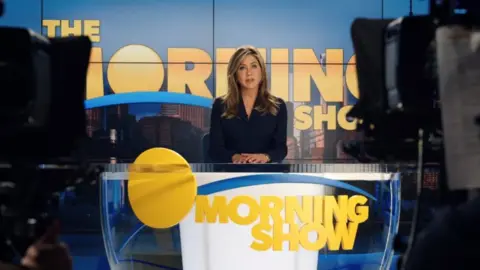 Apple
AppleOne of the most popular subjects for TV shows in recent years has been TV shows themselves.
Whether it's 30 Rock, The Newsroom or Episodes, audience appetite for series which go behind the scenes of the media industry seems higher than ever.
But are they genuinely popular with the public, or does the media just love a story about itself?
The first full-length trailer for The Morning Show, the latest programme about a programme, was released on Monday ahead of its broadcast launch this autumn.
The Apple TV series tells the story of a breakfast show host (played by Jennifer Aniston), whose co-presenter (Steve Carell) is fired after sexual misconduct allegations.
As bosses scramble to find her a new co-host, a rivalry emerges between Aniston's character and a newer presenter (played by Reese Witherspoon) - all while the show itself struggles to stay relevant in an era of immediate and 24-hour news.
Apple have poured a lot of money into the series ahead of the launch of their streaming service later this year. According to The Financial Times, the company committed more than $6bn (£4.96bn) in total for original films and TV shows, including several hundred million for The Morning Show.
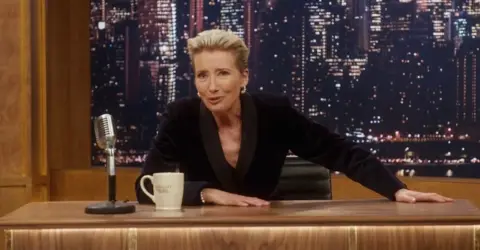 Amazon Studios
Amazon StudiosThe Aniston series is the latest in a whole host of TV shows to take an audience behind the camera - which raises the question of why viewers find them so fascinating.
(Several films have also recently tackled the subject, like 2011's Morning Glory with Harrison Ford and Diane Keaton, and Late Night starring Emma Thompson, released earlier this year.)
"We all consume TV news, but it's quite hard to actually see behind it because it has to look so professional," says BBC Breakfast's Naga Munchetty. "But the characters you find behind the scenes are so interesting."
One criticism that has been levelled at dramas and sitcoms set behind the camera is that they are just navel-gazing - the media obsessed with itself yet again.
"There's always that risk," Munchetty says, "But I think if you're really into politics you'll watch The Thick of It and The West Wing, and similarly if you love TV or news, you'd enjoy something like this as well.
"Look how many medical programmes there are, or shows about lawyers or the police - we're fascinated by certain industries whether we work in them or not."
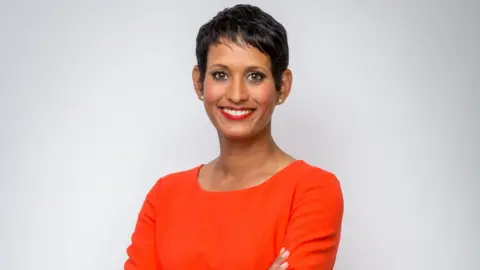
Critics have often praised these shows - albeit more so for their scripts and characterisation than their settings.
"Studio 60, like 30 Rock, is better when it's not about network television, but about the people who happen to work inside it," wrote Alessandra Stanley in The New York Times in 2006, the year both shows hit the airwaves. "And at their best, the two shows are unequalled by anything else on network television."
Looking ahead to Aniston's new show, Munchetty is confident the writers won't be short of material.
"Lots of stuff happens behind the scenes that is amusing," she says. "Guests and presenters sneaking in, slurps of tea being hurriedly swallowed when it's supposed to be be our turn to talk.
"Correspondents trying to tell the story when members of the public are interfering with their job - making noise, pulling funny faces and so on."
The BBC Breakfast presenters themselves even have a tough time holding things together - regularly falling into fits of giggles, much to the delight of viewers.

TV shows about TV shows
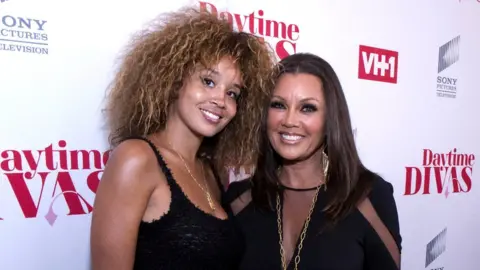 Getty Images
Getty Images- Daytime Divas - VH1 series which sees Vanessa Williams play the creator and executive producer of a lunchtime talk show
- The Newsroom - HBO series written by Aaron Sorkin set in, well, a newsroom, starring Jeff Daniels and Dev Patel
- 30 Rock - Tina Fey's NBC comedy series set behind the scenes of a fictional live sketch comedy show
- The Hour - A BBC Two drama set in the 1950s, written by Abi Morgan and starring Dominic West
- Episodes - BBC comedy starring Matt LeBlanc about two British TV writers who take their sitcom to the US
- Studio 60 on the Sunset Strip and Sports Night - Two more TV shows written by Sorkin, set on a Saturday night comedy sketch show and a cable sports programme respectively
- The Larry Sanders Show, which aired in the 1990s, is seen by many as a classic of the genre. Going slightly further back - The Mary Tyler Moore Show was so popular in the 1970s it led to three spin-offs

"Sometimes the audience catches our slip-ups and likes to get a bit of insight - the ability to roll with the mistakes makes the job easier," Munchetty says.
"In fact, one of the things I learned was if you make a mistake, you laugh it off, because we're all human, and it can often seem like people reading the news are one step removed from everyone else."
The questions presenters get asked every day by members of the public are perhaps proof of how interested viewers are in the process of putting TV shows together.
"'What time do you wake up? Who's your favourite person to work with? What time do you go to bed?' People love to know the most difficult guests and things like that," Munchetty laughs.
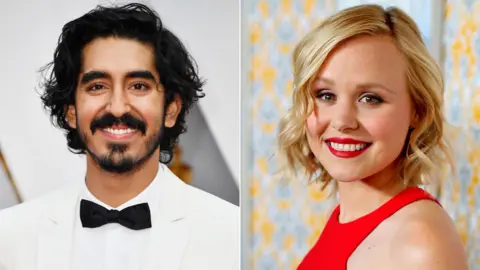 Getty Images
Getty ImagesBut presenting a TV news programme is a lot harder than it looks, she adds.
"This new series would need to show that it understands how much work is needed to be able to appear breezy and relaxed first thing in the morning," says Munchetty.
"If you know your stuff you can be very relaxed. You're never allowed to moan about being tired - everyone there is so there's no point talking about it."
Munchetty jokes there would be a fair few storylines to be written about "guests who turn it on for the camera but off camera are as cold as ice".
One trap that shows based in newsrooms can easily fall into is presenting a sanitised version of a job that isn't as glamorous as it looks.
The Guardian's Brian Moylan was among the critics who felt HBO's The Newsroom was a little preachy and idealistic. "The problem with Sorkin's fatally flawed mission is that it could never exist in the real world," he wrote.
Munchetty herself points out that one of the many pitfalls a show like this could fall into would be for it to "become farcical".
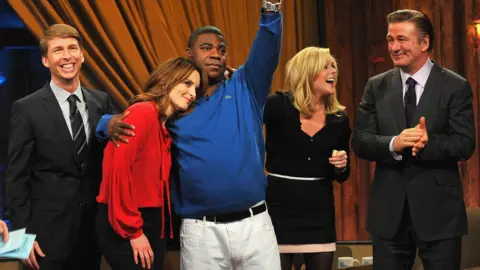 Getty Images
Getty Images"Don't forget we are journalists and have to cover serious stories every day," she says.
"We are one of the first sources of news for families and must make sure we are accurate, accessible and timely. We have to finely balance the need to be serious and fun - not always easy as we are led by the news of the day.
"As breakfast presenters, we're part of people's lives. We are there while the audience is getting on with their day, while they have their routine, and so you have to be really aware that people feel they know you."
Asked whether she might watch Aniston's new show, she jokes: "Yes - as long as is not on too late in the evening!"
An earlier version of this article appeared in August 2017, when The Morning Show was first commissioned.

Follow us on Facebook, or on Twitter @BBCNewsEnts. If you have a story suggestion email entertainment.news@bbc.co.uk.
